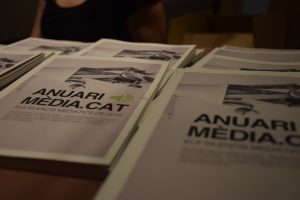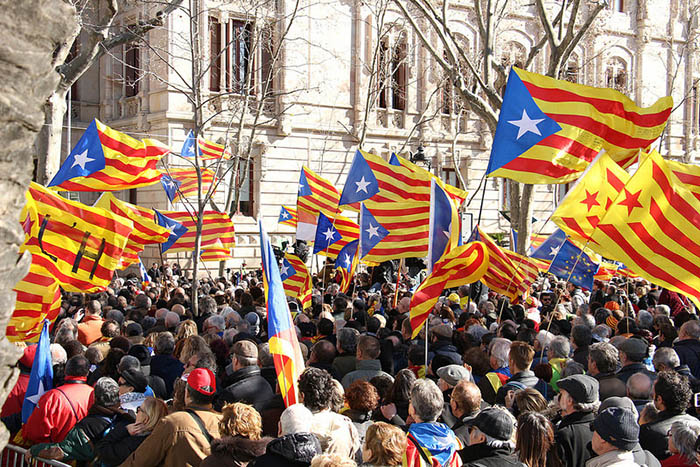6 Apr 2018 | Awards, Fellowship 2018, News and features
[vc_row][vc_column][vc_video link=”https://youtu.be/Kuztv8blNgY”][vc_column_text]
Mèdia.cat is a Catalan website devoted to highlighting media freedom violations and investigating under-reported or censored stories. Unique in Spain, it has been a particularly significant player in the last year when the heightened atmosphere in Catalonia over the disputed October independence referendum has brought issues of censorship and the impartiality of news, as well as the actions of public bodies like the police and government, under the spotlight.
Without the website, there would have been no online platform to catalogue systematically, publicly and in real time censorship perpetrated by the Spanish authorities against the local Catalan population. One of its most high-profile initiatives has been its Map on Censorship. This was set up two years ago in response to the Spanish government approving a so-called gag law, limiting the right to protest and effectively stopping people filming police officers. The Map on Censorship website was used particularly effectively during the 2017 crisis over the Catalan referendum campaign, giving the population in Catalonia live information about censorship, and other violations.
Between September and November 2017 as part its Map on Censorship initiative, journalists at Mèdia.cat documented and raised awareness about more than 125 possible restrictions on freedom of expression or information. All the incidents were related to the independence referendum in Catalonia of 1 October 2017, including both the lead up to the poll and its aftermath. The site deployed a team of 11 volunteer journalists to provide live updates on media freedom violations. The crisis in Catalonia in the last few months increased the reach and significance of the Map on Censorship with the map having 55,523 visits from 1 January to 12 November 2017.
Mèdia.cat describes itself as a critical media watchdog. It is run by a group of local Catalan journalists and publishes in Catalan about Catalonia. The financing for Mèdia.cat projects comes from a variety of sources including grants from the Catalan local government and the Barcelona City Council, crowdsourcing, foundations and donations. Mèdia.cat maintains its independence and is part of the Ramon Barnils group of journalists.
Mèdia.cat’s Hate Speech Media Watchdog ( https://www.media.cat/discursodimitjans/) also identified eight far-right media outlets in Spain which use fake news and other strategies to spread racism, xenophobia and islamophobia, among other forms of discrimination.

On their spot on the 2018 shortlist, Journalist at Mèdia.cat said “It is a great honor to be nominated to the Freedom of Expression awards. We were inspired by Index on Censorship’s work when we launched our Map on Censorship in 2015, which nowadays has become one of our most relevant projects. The nomination itself feels like an award for us. Especially in the current context, where freedom of expression is at stake in Catalonia and the Spanish state. Journalists have suffered physical aggressions, threats and other restrictions to their jobs, some artists have been censored and even retweeting a critical message can get you accused. We need to fight against this situation, unique in Western Europe, and this nomination is a great encouragement to do so.”
See the full shortlist for Index on Censorship’s Freedom of Expression Awards 2018 here.[/vc_column_text][/vc_column][/vc_row][vc_row full_width=”stretch_row_content” equal_height=”yes” el_class=”text_white” css=”.vc_custom_1490258749071{background-color: #cb3000 !important;}”][vc_column width=”1/2″][vc_custom_heading text=”Support the Index Fellowship.” font_container=”tag:p|font_size:28|text_align:center” use_theme_fonts=”yes” link=”url:https%3A%2F%2Fwww.indexoncensorship.org%2Fsupport-the-freedom-of-expression-awards%2F|||”][vc_column_text]
By donating to the Freedom of Expression Awards you help us support
individuals and groups at the forefront of tackling censorship.
Find out more
[/vc_column_text][/vc_column][vc_column width=”1/2″ css=”.vc_custom_1521479845471{background-image: url(https://www.indexoncensorship.org/wp-content/uploads/2017/05/2017-awards-fellows-1460×490-2_revised.jpg?id=90090) !important;background-position: center !important;background-repeat: no-repeat !important;background-size: cover !important;}”][/vc_column][/vc_row][vc_row][vc_column][vc_basic_grid post_type=”post” max_items=”4″ element_width=”6″ grid_id=”vc_gid:1522918006370-df72cba5-2f37-3″ taxonomies=”10735″][/vc_column][/vc_row]
29 Sep 2017 | Mapping Media Freedom, Media Freedom, media freedom featured, News and features
[vc_row][vc_column][vc_column_text]
The government of Catalonia, the semi-autonomous northeastern-most region of Spain, is scheduled to hold an independence referendum on 1 October. Despite heavy opposition from the government in Madrid, Catalan president Carles Puigdemont says the plebiscite will go ahead.
The Spanish government has deemed the referendum illegal and unconstitutional, resulting in arrests, raids and clashes between protesters and the police. Mariano Rajoy, the Spanish prime minister, has since stated that the referendum “won’t happen” after the seizing of millions of ballot papers and a crackdown on Catalan officials. Puigdemont has announced that regardless of voter turnout, a majority of the “yes” vote will result in a declaration of independence within 48 hours.
The stern reaction by the national government has caused not only much conflict within the region but also violations against media freedom.
On 9 September, Spanish police raided the headquarters of the Tarragona-based weekly magazine El Vallenc. Police were reportedly searching for material which might be used to support the vote for independence.
Francesc Fàbregas, the director for the magazine, later told reporters that police were looking for voting papers and ballots that could have been printed at the office. “We didn’t commit any crime. They didn’t take any voting papers because they didn’t find them.”
On 31 July, various reporters and photographers reported that they were insulted and threatened by Spanish unionists while they were covering a street protest in Barcelona where unionists and pro-Catalan independence demonstrators opposed each other.
About a hundred left-wing supporters of Catalan independence, summoned by anti-capitalist political party CUP, protested in front of the local police barracks. At the same time about a hundred Spanish right-wing supporters organised a counter-protest against the independence movement and supported the police.
Gemma Aguilera, a journalist for the news website El Món, received death threats as an unidentified protester shouted at her: “I will find you and kill you.” Protesters shouted at Aguilera using the word “bitch” and threatened another male reporter, telling him they would “cut [his] throat”.
Responding to these media violations, the Association of Catalan Journalists, a Barcelona-based organisation committed to protecting press freedoms in the region, released a statement reporting that since the beginning of the referendum they have “received complaints from journalists who have been coerced or forced to identify themselves during the coverage of events of public interest, pressured on writings and warned about their work”.
“These events constitute a serious and frontal attack on the freedom of expression and information. As professionals of journalism and communication, due to the respect for the society we serve and to whom we are responsible, we cannot allow silence to be the answer,” ACJ stated. “The fundamental rights of freedom of expression and information cannot be eroded, and the public and private media have the duty and the right to work freely to be able to inform about them.”
ACJ have since “demand[ed] the immediate halt” of the threats and obstructions.
Daniel Gascón, an editor for Letras Libres España, has explained in a recent article on the referendum that the Spanish authorities are simply employing its full legal arsenal to stop the unconstitutional referendum. In a statement to Index on Censorship, Gascón said: “The Spanish government’s duty is to uphold the Constitution. The Spanish state has to protect the rights of its citizens – in doing so it must obviously respect its own laws, which consecrate the principle of freedom of expression.”
In regards to the Catalan media being a part of either side’s campaigning strategy, Gascón said that “public media in Catalonia have often assumed a partial point of view”, yet “there should be a conversation about the use of TV3 as a political instrument and about the promiscuity between the media and the political sphere”.
“In June the Catalan parliament passed a notion not to pay subsidies to media that did not publicize the referendum,” Gascón added. “In the last few months, there have been some worrying instances of journalists singled out by Catalan government officials.”
Reports submitted to Index on Censorship’s Mapping Media Freedom project regarding the referendum do not just show violations from unionists. Voices critical of the Catalan government have also been silenced in the heated run-up the referendum.
On 22 July, the Barcelona-based daily newspaper La Vanguardia did not publish a column written by writer and journalist Gregorio Morán in which he criticised the regional government of Catalonia.
The piece, entitled The Media of the National Movement (Los Medios del Movimiento Nacional), mentioned Márius Carol, the director of La Vanguardia, and quoted part of one of his articles.
Morán accused the Catalan media of receiving large sums of public money and added that it was no surprise to see them praising Catalan independence. He also called the Catalan government “corrupt” and described them as the “taliban who govern us”.
Morán was not given an explanation as to why his article was pulled.[/vc_column_text][/vc_column][/vc_row][vc_row][vc_column][vc_basic_grid post_type=”post” max_items=”4″ element_width=”6″ grid_id=”vc_gid:1506684697693-438cce07-99f6-8″ taxonomies=”199″][/vc_column][/vc_row]



